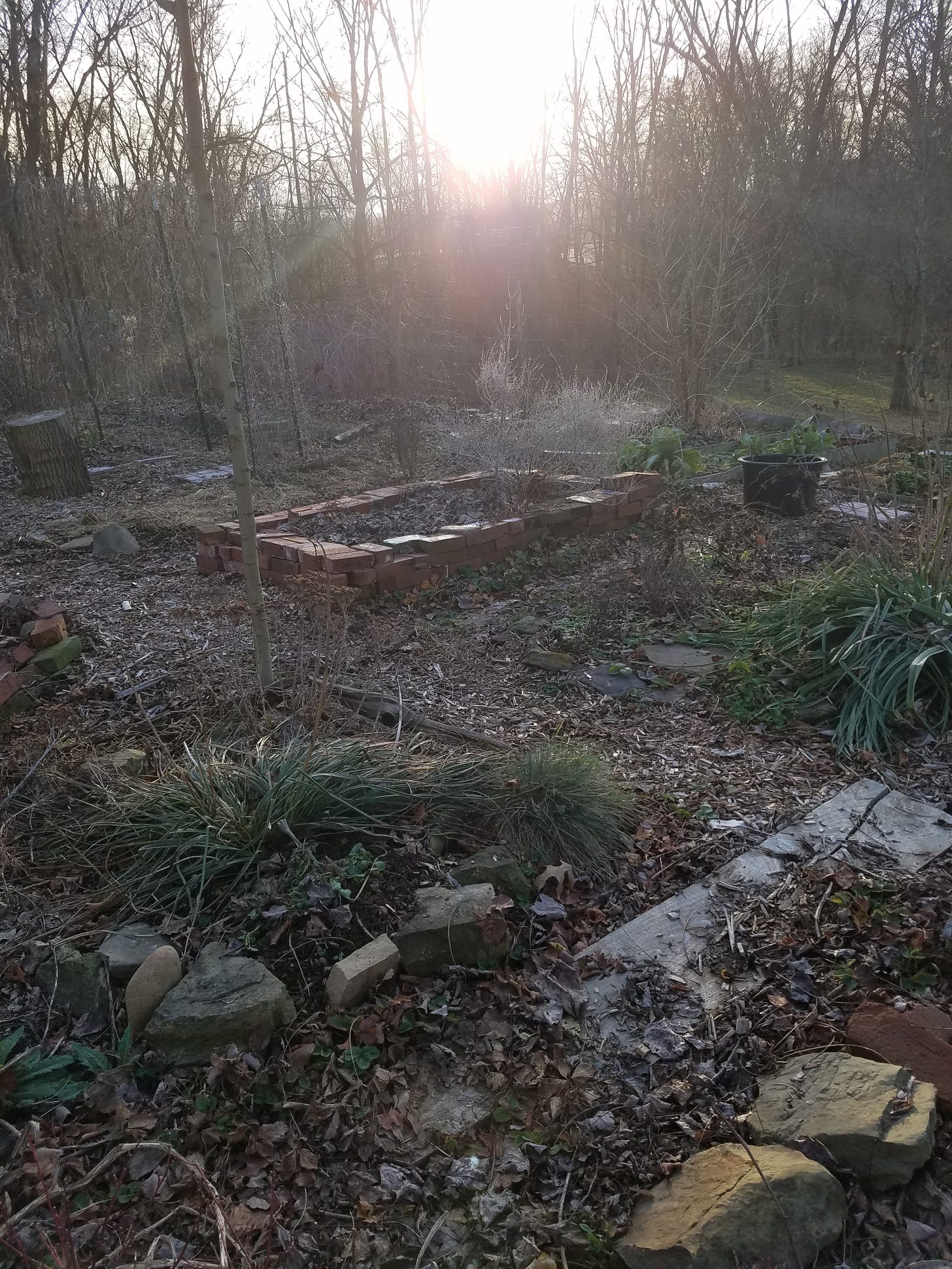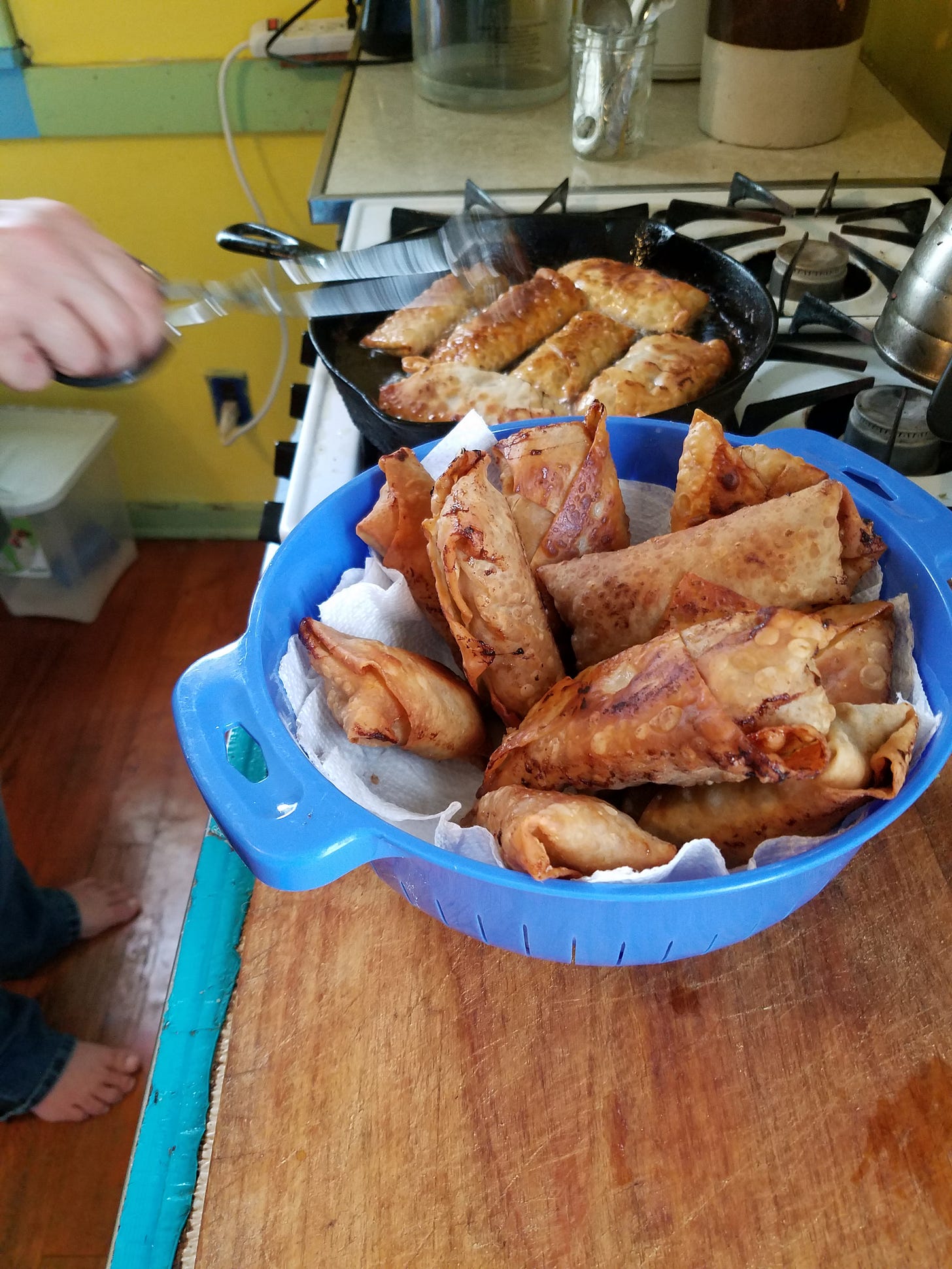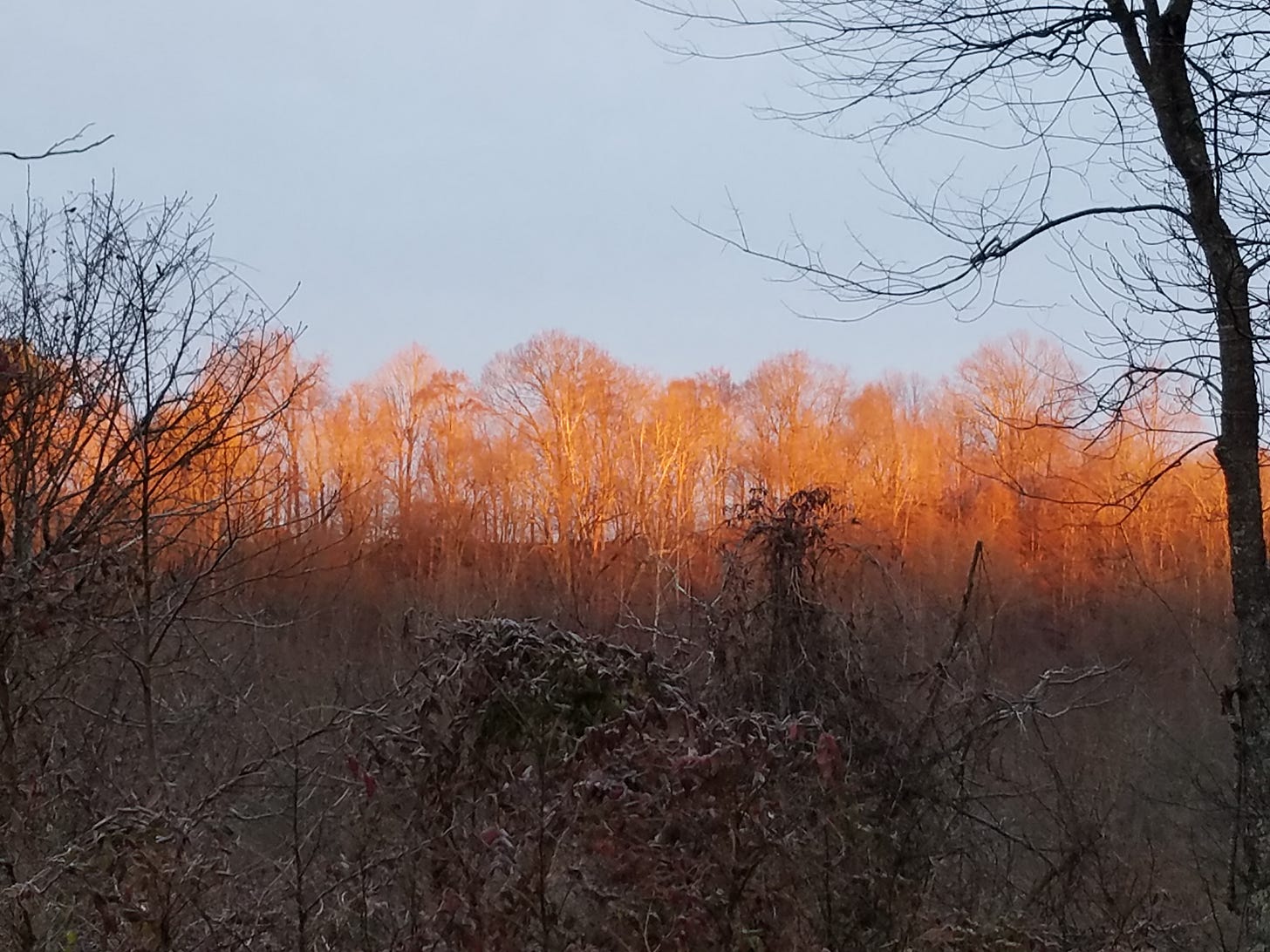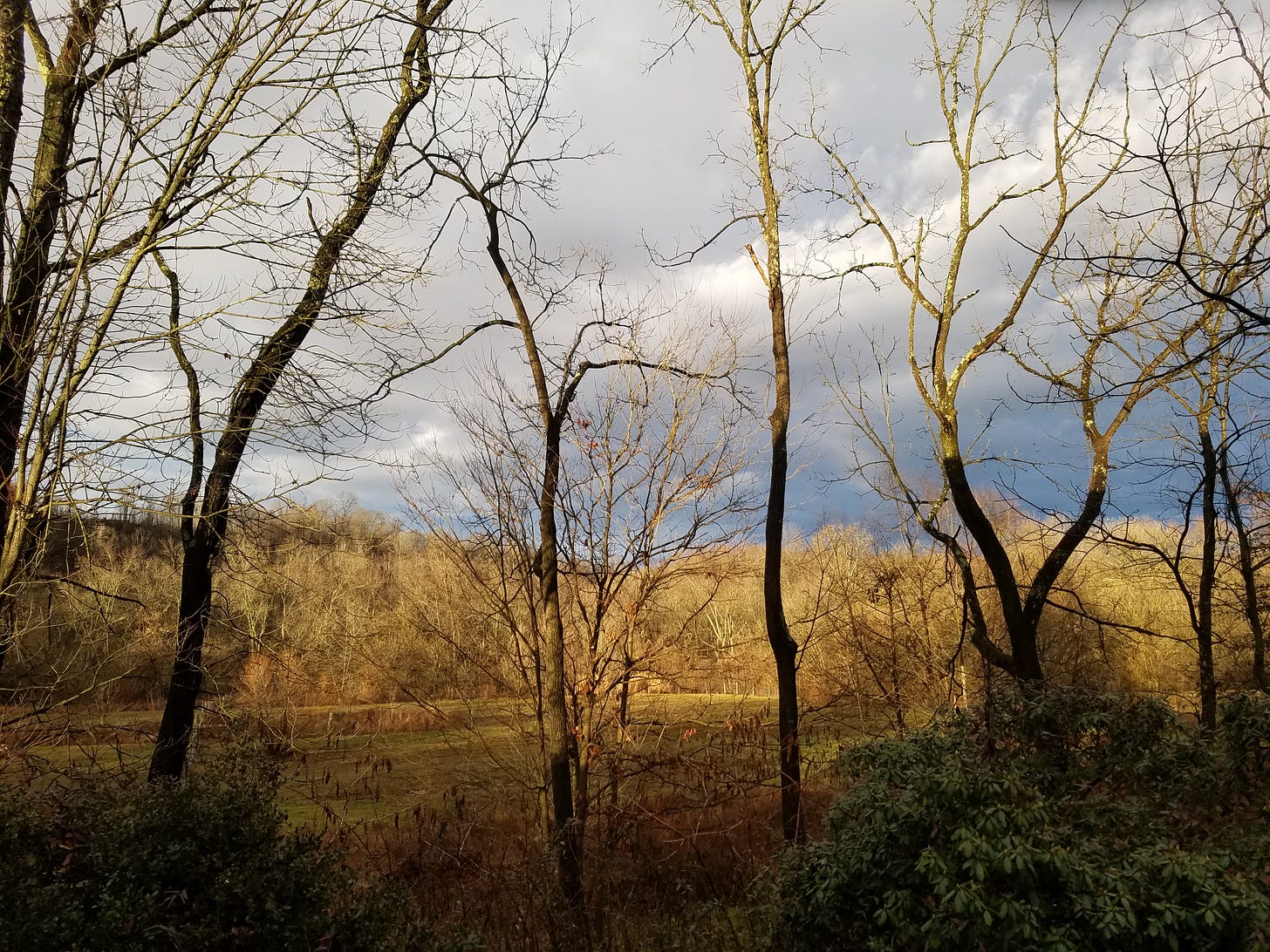Foodies, hobby farms, homesteads, and Nazis
Language is important, writers should be protecting it, illustrated with January photos
As someone who writes, I am preoccupied with words and subtle nuances of meaning. For instance, in the previous sentence I hesitated over using the word writer to describe myself. I don't feel like a writer, but I'm definitely someone who writes, so the phrase seems more accurate.
Nitpicky? Yes, but I'm sure others who write will empathize with the obsession over word choice. Each individual decision means little, but a string of choices adds up to a piece I'm happy with, or one I'm not.
The preoccupation intrudes into everyday life, such as when I am gathering eggs in the henhouse and the question arrives unbidden, “Are the chickens perching on roosts, or roosting on perches?” I can't be sure of the answer, but it is a conundrum I will surely wrangle with in a future post on chicken-keeping.
Word choice also weighs heavily in self-concept. I used to think I was a foodie, until my son informed me I wasn't and neither was he. Foodies are posh, and jet around in search of new food finds to beam out via Instagram posts from exclusive restaurants. He didn't use those words exactly, but his words created that image in my mind.
We're not posh — at least not by American standards — and we never jet around, so now I'm reduced to a person who is merely preternaturally interested in the preparing and consuming of food. I can really feel the difference, let me tell you. (Luckily I am still able to post food photos.)
I won’t judge anyone who considers herself to be a foodie, nor attempt to argue anyone out of being one. Language is malleable, words have nuances of meaning. But how can I be sure exactly what is meant by a word without having a conversation with its user? Communication is so much easier if I know someone, which usually leads to caring about the meaning they wish to impart. The fact that most communication these days is online with people we don't know leaves it ripe for obfuscation.
Another recent nomenclature epiphany: Hobby farm can be used pejoratively to mean someone who farms only for recreation, a wealthy landowner who doesn't need the land to provide income. I thought I was a hobby farmer because I work full time and engage in farming-adjacent activities evenings and weekends — in other words, as a hobby. But there's a world of difference between Ted Turner and me. The term is broad enough to include both of us, but when encountering the word, can you be sure from context clues of the intended meaning?
Consider also homesteading: The Homestead Act was repealed in 1976 (excepting Alaska) so the question arises, what exactly are all those Youtubers doing? Are present day practitioners aware that the original, specific meaning of the word was to live on a piece of land for a certain amount of time while installing farm infrastructure, with the aim of eventually being awarded the deed? Now it appears to mean owning a wide variety of domestic animals and a wider variety of machinery, and to bandy about words like self-sufficiency in professionally edited mini-films while inviting viewers to “join us on our journey.”
I'm not a word usage Nazi. I'm not condemning 21st century newcomers for appropriating a term, or bashing them for not being knowledgeable of history. Not only do words change and evolve with culture to produce various meanings, in English we have multiple words with exactly the same meaning. I celebrate this state of affairs that has brought us such wonders as the pun, the double entendre, and the thesaurus.
The problem with gradual erosion of the previous significance of words — meaning creep if you will — is that it facilitates the use of words to obfuscate, rather than illuminate meaning. This is not a new development by any means, but the process is accelerating and the issue is particularly germaine in the age of ubiquitous social media, deep fakes, and much less human interaction. We can each hear (or read into) what we want to hear and disregard the rest more easily than ever. People who write are the caretakers of language, and we should all be concerned.
While writing this piece I received in my inbox a brilliant take on the topic at
by in which he explores what he calls semantic gentrification in the gender industry. As he explains, not only have words like gender, sex, and conversion therapy changed under the ministrations of gender ideology zealots, their meanings have been nearly reversed. Language originally meant to legally safeguard women and the same-sex attracted has been perverted and turned on its head to instead protect the trans-indentifying. His piece is a must-read for anyone concerned with the dangers of woke culture and how language is being subverted to advance it.I genuinely wish that the worst of this matter was merely imprecise meanings of terms like homestead, but it's not, and Dave Hewitt's post should be a wake-up call about the gravity of the situation. It's happening everywhere. What was once sexual mutilation of children is now gender affirming care. In Israel-Palestine, genocide is simply war, and ethnic cleasing is voluntary migration. The cutting of mature forests and the destruction of associated ecosystems is forest management (to prevent wildfires) and renewable energy (biomass). And of course, anyone you don't like is now a Nazi.
Nazi is word I usually avoid. I agree with fellow Appalachian Substacker
that the epithet is overused and thus diluted in meaning. I did, however, use it in a previous paragraph when I claimed not to be a syntactic pedant. It enabled me to express myself precisely and (I hope) humorously, so I made an exception.I'm guessing readers knew exactly what I meant by word usage Nazi, but in general the word Nazi is so ubiquitous it's nearly meaningless. Or, to be more precise, its meaning is so nebulous that we can each interpret it however we please. I confess that I didn't pay attention to the Substack Nazi kerfuffle, mainly because of the amorphous nature of the term. I didn't feel like spending valuable time slogging through commentary to sort it all out, especially when most of it seemed to be generated by dogpilers more interested in promoting themselves rather than explicating the situation.
I gleaned enough information to decide that it was a tempest in a teapot, which, on reflection, pretty much sums up social media. It's not that I'm unconcerned with racists, white supremacists, skinheads, fascists, and other bad guys that are conjured by the word Nazi. But as with homesteading, there is no objective meaning to the word, since the historical meaning is obsolete.
What if, instead of using this shorthand word for really bad person, each writer defined in a few short sentences exactly who the villain is? This should be a simple task for people who write. How different the whole Substack uproar would have been, with clear meaning and more opportunities for honest debate.
People who write have a special responsibility to language. Not to protect it from change, but to lead by example by respecting it and using it to the best of our abilities to disambiguate rather than obfuscate. It is literally our task to communicate meaning through words, and we should be taking it seriously.











RE the redefining of words: your piece made me remember "doublethink" from 1984. I dug up this quote: "All that was needed was an unending series of victories over your own memory." Yes. I too am annoyed when something is redefined as something that might even mean the opposite but it's sort of inevitable I think. The horse of proper usage has left the barn. Everything is fluid in language and with the internet we find ourselves more and more in a cultural beehive. Poke it one spot and the bees will get excited on the other end. I don't really hang out with academics or intellectuals who are the ones who've made an industry of launching freighted terms. "Heteronormative" is one that when I first heard it I found particularly patronizing. But people who use terms like that do not live in the same world I do. (I say this in spite of my beehive analogy.) All this stuff is completely outside my control and in my own writing I'm kind of moving in the direction of style over strict meaning which I guess is the art of bullshitting, bullshit being a word that is fairly safe from getting redefined... What am I talking about? I have no idea. I just like talking. I am blissfully unaware of the "substack nazi kerfluffle." Also I'd never heard of the new "homesteader" culture but from your description I can totally imagine it. Maybe they can call themselves "earth influencers." Has a nice ring to it , eh? I'm a little bummed that you are holding down a full time job while doing turtle paradise. All those wonderful veggies and eggs you produce must be giving you a superpower. I hope your job is one that provides some inspiration and a place to try out new and original terms to seed the English language. Feel free to use "earth influencers." Ha!
We use the term “peasant gourmet” around here...but then if we examine that too closely “peasant”probably presents some issues. I’ll just go ahead growing food, cooking it as close to harvesting as I can, and enjoying both the process and the end result.
Thanks for sharing the other articles. After years of thought and questions and discussion, I still dont feel qualified to even offer an opinion. Those are big, deep, sensitive topics. So important that they aren’t swept under the rug, but so hard to engage in productive discourse about them.